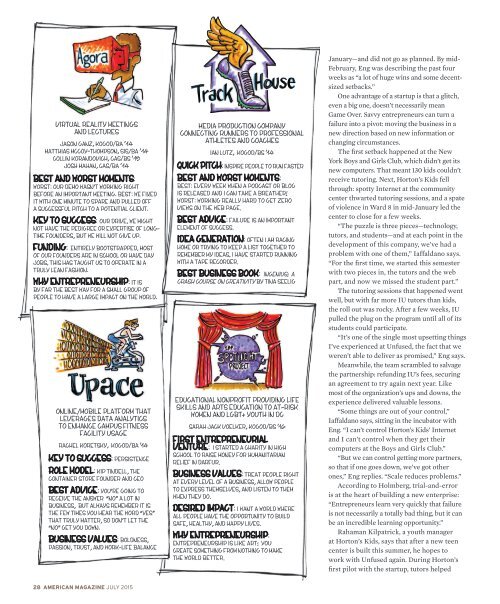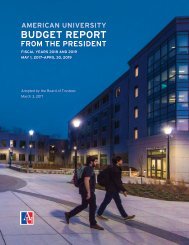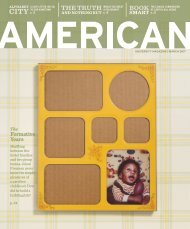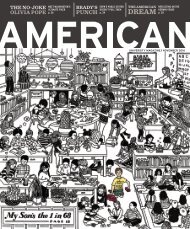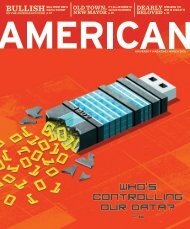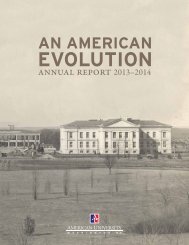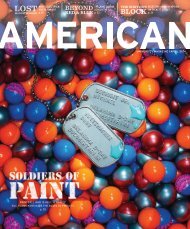American Magazine, July 2015
This issue, meet Maryland First Lady Yumi Hogan, learn about Kogod’s startup incubator, explore the Smithsonian’s new American Enterprise exhibit, hop on the Metro to Navy Yard—Ballpark, and get to know some of AU’s 1,200 Atlanta transplants. Also in the August issue: footwear on campus, 12 Eagles to follow on Twitter, and a new quiz with a tasty prize.
This issue, meet Maryland First Lady Yumi Hogan, learn about Kogod’s startup incubator, explore the Smithsonian’s new American Enterprise exhibit, hop on the Metro to Navy Yard—Ballpark, and get to know some of AU’s 1,200 Atlanta transplants. Also in the August issue: footwear on campus, 12 Eagles to follow on Twitter, and a new quiz with a tasty prize.
Create successful ePaper yourself
Turn your PDF publications into a flip-book with our unique Google optimized e-Paper software.
Virtual reality meetings<br />
and lectures<br />
Jason Ganz, Kogod/BA ’14<br />
Matthias McCoy-Thompson, SIS/BA ’14<br />
Collin Korandovich, CAS/BS ’15<br />
Josh Mahan, CAS/BA ’14<br />
BEST AND WORST MOMENTS:<br />
Worst: Our demo wasn’t working right<br />
before an important meeting. Best: We fixed<br />
it with one minute to spare and pulled off<br />
a successful pitch to a potential client.<br />
KEY TO SUCCESS: Our drive. We might<br />
not have the pedigree or expertise of longtime<br />
founders, but we will not give up.<br />
FUNDING: Entirely bootstrapped. Most<br />
of our founders are in school or have day<br />
jobs. This has taught us to operate in a<br />
truly lean fashion.<br />
WHY ENTREPRENEURSHIP: It is<br />
by far the best way for a small group of<br />
people to have a large impact on the world.<br />
Online/mobile platform that<br />
leverages data analytics<br />
to enhance campus fitness<br />
facility usage<br />
Rachel Koretsky, Kogod/BA ’14<br />
KEY TO SUCCESS: Persistence<br />
ROLE MODEL: Kip Tindell, The<br />
Container Store founder and CEO<br />
BEST ADVICE: You’re going to<br />
receive the answer “no” a lot in<br />
business, but always remember it is<br />
the few times you hear the word “yes”<br />
that truly matter, so don’t let the<br />
“no” get you down.<br />
BUSINESS VALUES: Boldness,<br />
passion, trust, and work-life balance<br />
Media production company<br />
connecting runners to professional<br />
athletes and coaches<br />
Ian Lutz, Kogod/BS ’14<br />
QUICK PITCH: Inspire people to run faster<br />
BEST AND WORST MOMENTS:<br />
Best: Every week when a podcast or blog<br />
is released and I can take a breather!<br />
Worst: Working really hard to get zero<br />
views on the web page.<br />
BEST ADVICE: Failure is an important<br />
element of success.<br />
IDEA GENERATION: Often I am racing<br />
home or trying to keep a list together to<br />
remember my ideas. I have started running<br />
with a tape recorder.<br />
BEST BUSINESS BOOK: inGenius: A<br />
Crash Course on Creativity by Tina Seelig<br />
Educational nonprofit providing life<br />
skills and arts education to at-risk<br />
women and LGBT+ youth in DC<br />
Sarah Jack Voelker, Kogod/BS ’16<br />
FIRST ENTREPRENEURIAL<br />
VENTURE: I started a charity in high<br />
school to raise money for humanitarian<br />
relief in Darfur.<br />
BUSINESS VALUES: Treat people right<br />
at every level of a business, allow people<br />
to express themselves, and listen to them<br />
when they do.<br />
DESIRED IMPACT: I want a world where<br />
all people have the opportunity to build<br />
safe, healthy, and happy lives.<br />
WHY ENTREPRENEURSHIP:<br />
Entrepreneurship is like art: you<br />
create something from nothing to make<br />
the world better.<br />
January—and did not go as planned. By mid-<br />
February, Eng was describing the past four<br />
weeks as “a lot of huge wins and some decentsized<br />
setbacks.”<br />
One advantage of a startup is that a glitch,<br />
even a big one, doesn’t necessarily mean<br />
Game Over. Savvy entrepreneurs can turn a<br />
failure into a pivot: moving the business in a<br />
new direction based on new information or<br />
changing circumstances.<br />
The first setback happened at the New<br />
York Boys and Girls Club, which didn’t get its<br />
new computers. That meant 130 kids couldn’t<br />
receive tutoring. Next, Horton’s Kids fell<br />
through: spotty Internet at the community<br />
center thwarted tutoring sessions, and a spate<br />
of violence in Ward 8 in mid-January led the<br />
center to close for a few weeks.<br />
“The puzzle is three pieces—technology,<br />
tutors, and students—and at each point in the<br />
development of this company, we’ve had a<br />
problem with one of them,” Iaffaldano says.<br />
“For the first time, we started this semester<br />
with two pieces in, the tutors and the web<br />
part, and now we missed the student part.”<br />
The tutoring sessions that happened went<br />
well, but with far more IU tutors than kids,<br />
the roll out was rocky. After a few weeks, IU<br />
pulled the plug on the program until all of its<br />
students could participate.<br />
“It’s one of the single most upsetting things<br />
I’ve experienced at Unfused, the fact that we<br />
weren’t able to deliver as promised,” Eng says.<br />
Meanwhile, the team scrambled to salvage<br />
the partnership: refunding IU’s fees, securing<br />
an agreement to try again next year. Like<br />
most of the organization’s ups and downs, the<br />
experience delivered valuable lessons.<br />
“Some things are out of your control,”<br />
Iaffaldano says, sitting in the incubator with<br />
Eng. “I can’t control Horton’s Kids’ Internet<br />
and I can’t control when they get their<br />
computers at the Boys and Girls Club.”<br />
“But we can control getting more partners,<br />
so that if one goes down, we’ve got other<br />
ones,” Eng replies. “Scale reduces problems.”<br />
According to Holmberg, trial-and-error<br />
is at the heart of building a new enterprise:<br />
“Entrepreneurs learn very quickly that failure<br />
is not necessarily a totally bad thing, but it can<br />
be an incredible learning opportunity.”<br />
Rahaman Kilpatrick, a youth manager<br />
at Horton’s Kids, says that after a new teen<br />
center is built this summer, he hopes to<br />
work with Unfused again. During Horton’s<br />
first pilot with the startup, tutors helped<br />
28 AMERICAN MAGAZINE JULY <strong>2015</strong>


